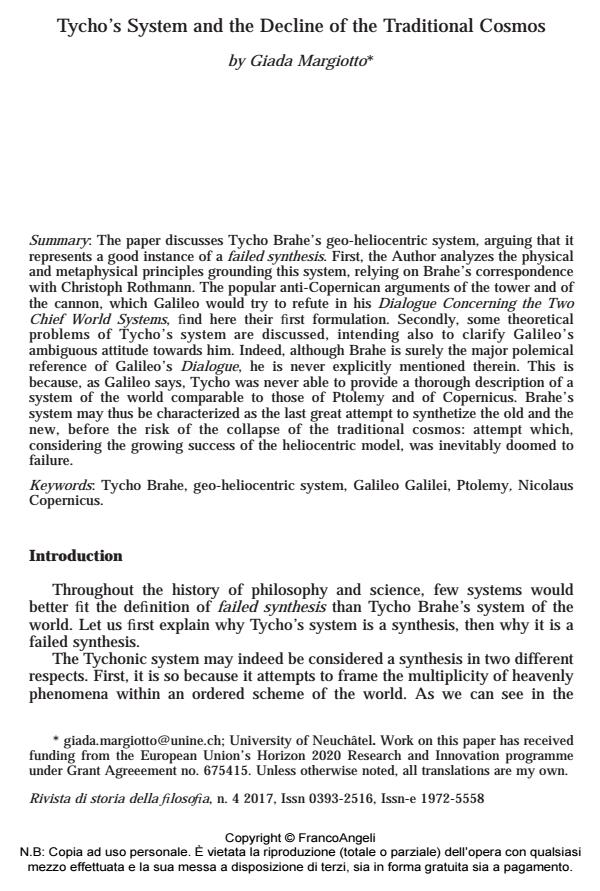Tycho’s System and the Decline of the Traditional Cosmos
Journal title RIVISTA DI STORIA DELLA FILOSOFIA
Author/s Giada Margiotto
Publishing Year 2017 Issue 2017/4
Language English Pages 9 P. 607-615 File size 36 KB
DOI 10.3280/SF2017-004006
DOI is like a bar code for intellectual property: to have more infomation
click here
Below, you can see the article first page
If you want to buy this article in PDF format, you can do it, following the instructions to buy download credits

FrancoAngeli is member of Publishers International Linking Association, Inc (PILA), a not-for-profit association which run the CrossRef service enabling links to and from online scholarly content.
The paper discusses Tycho Brahe’s geo-heliocentric system, arguing that it represents a good instance of a failed synthesis. First, the Author analyzes the physical and metaphysical principles grounding this system, relying on Brahe’s correspondence with Christoph Rothmann. The popular anti-Copernican arguments of the tower and of the cannon, which Galileo would try to refute in his Dialogue Concerning the Two Chief World Systems, find here their first formulation. Secondly, some theoretical problems of Tycho’s system are discussed, intending also to clarify Galileo’s ambiguous attitude towards him. Indeed, although Brahe is surely the major polemical reference of Galileo’s Dialogue, he is never explicitly mentioned therein. This is because, as Galileo says, Tycho was never able to provide a thorough description of a system of the world comparable to those of Ptolemy and of Copernicus. Brahe’s system may thus be characterized as the last great attempt to synthetize the old and the new, before the risk of the collapse of the traditional cosmos: attempt which, considering the growing success of the heliocentric model, was inevitably doomed to failure.
Keywords: Tycho Brahe, geo-heliocentric system, Galileo Galilei, Ptolemy, Nicolaus Copernicus
- Brahe 1913: Tycho Brahe, Opera omnia. Scripta astronomica tomus 1, ed. by Louis Emil Dreyer, Libraria Gyldendaliana, Copenhagen 1913.
- Brahe 1919: Id., Opera omnia. Epistolae astronomicae tomus 1, ed. by Louis Emil Dreyer, Libraria Gyldendaliana, Copenhagen 1919.
- Brahe 1922: Id., Opera omnia. Scripta astronomica tomus 4, ed. by Louis Emil Dreyer, Libraria Gyldendaliana, Copenhagen 1922.
- Bucciantini 2007: Massimo Bucciantini, Galileo e Keplero. Filosofia, cosmologia e teologia nell’età della Controriforma, Einaudi, Torino 2007.
- Christianson 1999: John Robert Christianson, On Tycho’s Island. Tycho Brahe and his Assistants, 1570- 1601, Cambridge University Press, Cambridge 1999.
- Copernicus 2009: Niccolò Copernico, Le rivoluzioni celesti. Libro primo, in Anna De Pace, Niccolò Copernico e la fondazione del cosmo eliocentrico, Bruno Mondadori, Milano 2009, pp. 237-408.
- De Pace 2005: Anna De Pace, Galileo interprete del Timeo, in Guido Canziani (ed.), Storia della scienza, storia della filosofia: interferenze, FrancoAngeli, Milano 2005, pp. 39-76.
- Galilei 1896: Galileo Galilei, Opere. Edizione nazionale, vol. 6, dir. by Antonio Favaro, Barbera, Firenze 1896.
- Galilei 1897: Id., Opere. Edizione nazionale, vol. 7, dir. by Antonio Favaro, Barbera, Firenze 1897.
- Galilei 2008: Id., The Essential Galileo, ed. and trans. by Maurice A. Finocchiaro, Hackett, Indianapolis/Cambridge 2008.
- Galilei 2009: Id., Scienza e religione, ed. by Massimo Bucciantini and Michele Camerota, Donzelli, Roma 2009.
- Kuhn 1957: Thomas S. Kuhn, The Copernican Revolution. Planetary Astronomy in the Development of Western Thought, Harvard University Press, Cambridge (MA) 1957.
- Koyré 1939: Alexandre Koyré, Études galiléennes, Hermann, Paris 1939.
- Lerner 1995: Michel-Pierre Lerner, L’entrée de Tycho Brahe chez les Jésuites ou le chant de cygne de Clavius, in Luce Giard (ed.), Les Jésuites à la Renaissance, Presses Universitaires de France, Paris 1995, pp. 145-185.
- Margolis 1991: Howard Margolis, Tycho’s system and Galileo’s Dialogue, in «Studies in the History and Philosophy of Science», 22, 1991, pp. 259-275.
- Rheticus 1982: Georg Joachim Rheticus, Narratio prima, ed. by Henri Hugonnard-Roche and Jean-Pierre Verdet, «Studia Copernicana» 20, 1982.
Giada Margiotto, Tycho’s System and the Decline of the Traditional Cosmos in "RIVISTA DI STORIA DELLA FILOSOFIA" 4/2017, pp 607-615, DOI: 10.3280/SF2017-004006